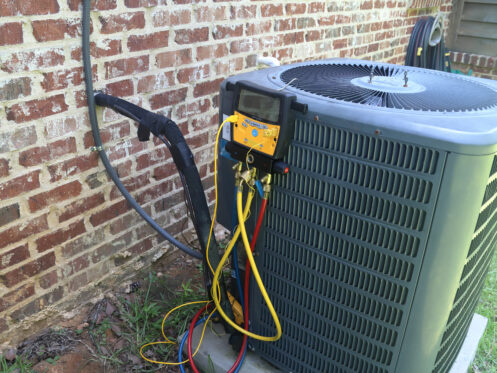When the summer heat hits, the last thing you want is an air conditioner that struggles to keep up—or worse, one that stops working altogether. Your cooling system works hard all season long, and if yours has not had a check-up in a while, it may not be running as efficiently as it should. Dust buildup, worn-out parts, and other small issues can also turn into bigger problems when temperatures rise. Scheduling a tune-up before the heat arrives not only prevents breakdowns and higher electricity bills but also ensures your home will be comfortable during the dog days of summer.
Reduce the Risk of Mid-Summer Breakdowns
Skipping a spring AC tune-up allows dust to accumulate, small leaks to develop, and electrical connections to loosen. Without maintenance, these minor issues can turn into major problems when the summer heat arrives, increasing the risk of an unexpected breakdown.
For instance, a loose wire might not seem like a big deal, but it can cause your cooling system to short cycle or shut down completely. On the other hand, a dirty evaporator coil can make the system work harder than it should, leading to overheating. A worn-out capacitor can stop the motor from starting, leaving you without cool air. Fixing these minor issues early prevents bigger repairs that take time and cost more to fix.
When an AC unit fails in the middle of summer, waiting for repairs can be frustrating. Many homeowners face cooling system issues when the weather changes, which means longer wait times for service. Taking care of maintenance before the busy season means your system is ready to run when you need it.
Lower Cooling Costs with a Well-Tuned System
An air conditioner that has to work harder than it should will use more electricity. Dirty components, grimy coils, and low refrigerant levels make your cooling system less efficient. When airflow is blocked or parts like a fanbelt are loose, the system needs more power to keep the temperature where you want it. That extra strain shows up in your energy bill.
A tune-up helps the system run as efficiently as possible. Maintenance tasks like cleaning the coils and adding refrigerant help the system transfer heat more effectively. Alternatively, lubricating the moving parts reduces friction. Each of these small tasks adds up to better performance and lower electricity use.
Ensure Strong, Consistent Airflow in Every Room
If some rooms in your home feel warmer than others, your air conditioner might not be distributing cool air evenly. Weak airflow from vents can make some areas of the house feel uncomfortably warm while others get too cold. These uneven temperatures can happen when the blower motor is not working properly, the filter is clogged, or the ductwork has leaks.
A tune-up helps improve airflow so that every room gets the cooling it needs. If the blower motor is not running at the right speed, it might need an adjustment or a new capacitor. A clogged air filter slows down airflow, making the system less effective. Replacing the filter allows air to move freely again. During an appointment, our technician will also check the connections between your ductwork and air handler to ensure that conditioned air is not escaping before it circulates through your home. Getting a tune-up helps your system cool your home more evenly, making every room feel more comfortable.
Extend the Lifespan of Your Air Conditioner
A tune-up helps prevent unnecessary stress on your central air conditioning system. Replacing a worn-out capacitor before it fails keeps the motor from overheating. Cleaning dirty coils prevents the compressor from working harder than it should. Checking refrigerant levels keeps the system from running inefficiently. Each of these small steps helps reduce the strain on the unit, allowing it to last longer before needing a replacement.
Most air conditioners last between 10 and 15 years, but without maintenance, that lifespan can be much shorter. A unit that breaks down frequently or runs inefficiently for years will wear out sooner. Keeping up with maintenance gives your system a better chance of lasting its full lifespan.
Prevent Moisture Buildup and Mold Growth
Your cooling system does more than just cool the air. It also helps regulate humidity levels. In fact, during muggy weather, a central air conditioner can remove up to 25 gallons of water from your home’s air daily. Too much wetness can build up inside your house if the system isn’t working right. High humidity makes the air feel warmer, even when the thermostat is set to a cool temperature. It can also lead to mold growth, which causes musty odors and affects indoor air quality.
A tune-up helps make sure your system is pulling moisture from the air as it should. During their visit, our technician will also check your air conditioner’s drainage system and clear the drain line if necessary. A clogged line can cause water to back up into your unit and result in permanent damage. It may also result in water damage to the interior of your home.
Keeping humidity under control is essential for both comfort and air quality. Regular maintenance prevents problems like condensation on windows, damp or musty smells, and water damage to your cooling system and home.
Catch Electrical Issues Before They Cause Problems
For your air conditioning system to function properly, its wires, capacitors, and contacts must be in good condition. If any of these components become loose or worn, the system may short cycle, struggle to start, or stop working entirely.
During a tune-up, our technician will inspect electrical connections to ensure they are secure. A loose wire can cause intermittent shutdowns, while a failing capacitor may prevent the compressor or fan from running, leaving your system unable to cool. Catching these issues early helps prevent unexpected breakdowns.
Faulty electrical components also pose a fire risk. Frayed wires or an overworked motor can generate excess heat, increasing the chance of electrical failures. Regular maintenance ensures these problems are identified and addressed before they lead to costly repairs or safety hazards.
Ensure Your Cooling System’s Safety Features Work Correctly
Your air conditioner has built-in safety features designed to protect both the system and your home. These include high-pressure switches, float switches, and sensors that detect overheating or refrigerant leaks. If these components are not working properly, your AC could continue running under unsafe conditions, leading to costly damage or even safety concerns.
By making sure these safety mechanisms are in working order, regular maintenance helps protect your home and cooling system from preventable issues. Ensuring these safeguards function correctly also gives you peace of mind that your AC will operate safely throughout the summer.
Schedule Your AC Tune-Up Before the Heat Arrives
At Pioneer Valley Environmental we have served the residents of Ware, MA and the surrounding areas since 1999. We install, maintain, and repair cooling and heating systems. If your AC has not had a spring check-up, schedule your HVAC tune-up with us today!








